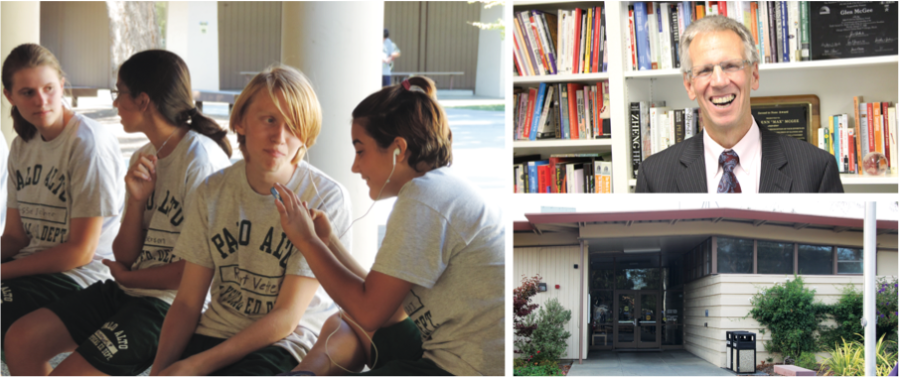PAUSD accused of PE inconsistencies
District allegedly falls short of state’s time requirements; faces preliminary injunction
Palo Alto Unified School District (PAUSD) is one of 90 school districts being sued for failing to meet a California state law which requires schools to provide students in grades K-6 with 200 minutes of physical education every 10 days, according to court documents filed with the San Francisco Superior Court.
Attorney Donald Driscoll, who represents the plaintiffs Cal200 and Marc Babin in their suit against the 90 districts, said that their mission is to advocate for the right of children to receive physical education as part of school curriculum.
“We want to get kids the physical education they need — to ensure that their health and their ability to be good students is protected,” Driscoll said. “Educators agree on this. In fact, many experts recommend more than 200 minutes every 10 school days. That’s only 20 minutes a day.”
Driscoll said Cal200 plans to file a motion on Oct. 12 for preliminary injunction against PAUSD and other school districts named in the suit. If approved, the injunction would force the district to immediately comply with state law.
Driscoll said his group would “set forth evidence that clearly shows that the PAUSD is out of compliance.” He said his group is “trying to get the district to act now and not wait while the case goes through the court system.”
PAUSD Superintendent Max McGee said the district is in compliance with state law regarding physical education and maintains that Palo Alto has a culture that supports physical health and wellbeing which translates into the district.
“We are speaking to our lawyers later this week,” McGee said. “I think we are in compliance — our students are receiving 200 minutes every 10 days. From what I’ve been given by the elementary principals and middle school principals, we are compliant.”
Cal200 is an unincorporated association headed by Babin, an Alameda resident who has not had children in California schools for 20 years. Driscoll began to push for physical education laws in 2010, when he filed a similar suit against Albany Unified School District for failing to provide his third-grade son with the proper amount of physical education. The suit resulted in a ruling by a California Court of Appeals that said parents and community members could sue a school district if it failed to provide the required minutes of physical education.
The organization filed similar suits against other California school districts in October and November 2013 to force school districts to meet the standard, with considerable success, according to Driscoll.
Cal200 and Babin submitted a Public Records Act request in 2012 to PAUSD, asking for documentation of the minutes of physical education for students at all of the district’s schools.
McGee said the Public Records Act request did not explain the basis of Cal200’s lawsuit against the district, or how the organization came to its conclusion.
“We responded to the public records request and the next thing we knew, we were being sued,” McGee said. “They did not contact me. It certainly wasn’t communicated to anyone in my office.”
The response from the district shows compliance with state law. Sample schedules for elementary, middle and high schools indicated that students receive at least 200 minutes of physical education every 10 days, with grades six through 10 receiving considerably more than the 200-minute requirement.
In 2015, Lozano Smith, a law firm under contract with PAUSD, responded to a uniform complaint filed by Babin and Cal200, reasserting the district’s commitment and substantial compliance to Education Code 51210§.
“The district employs designated physical education teachers that provide physical education instruction to the district’s first through third grade students for 30 minutes each week and to the district’s fourth and fifth grade students for 70 minutes each week,” Lozano Smith attorney Steve Ngo wrote. “In addition to this specialized instruction, the district’s multi-subject teachers also provide physical education which, to the best of the district’s current knowledge and belief, substantially meets the 200-minute obligation.”
Driscoll countered this assertion, claiming substantial compliance does not exist in Palo Alto.
“Substantial compliance, as some school districts are using it, is a vague term for saying we are not giving 200 minutes of physical education every 10 school days, but we are giving some and we think that should be enough,” Driscoll said. “In other words, they are saying ‘we should be able to violate the law.’”
According to Driscoll, past lawsuits from Cal200 have achieved settlements that will provide students in California with “approximately a billion minutes” of physical education per year that they were previously denied, despite the requirements set forth by law.
“Why would they not fulfill their role to provide students with adequate physical education is beyond me,” Driscoll said. “The people who are not providing students with adequate physical education will talk about the importance of physical education and then they won’t provide it.”
Your donation will support the student journalists of Palo Alto High School's newspaper



